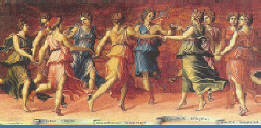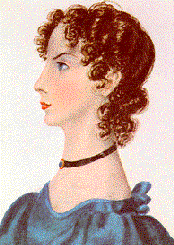|
|
Anne was born in Thornton but moved to Haworth in 1821 when her father was awarded
its perpetual curacy. Her mother died when Anne was one year old, however, and was
cared for at home by her maternal aunt with whom she developed a close relationship.
She also identified closely with her next elder surviving sister Emily.
She attended Roe Head school for two years, where her elder sister, Charlotte, taught
briefly, studying assiduously and gaining a good-conduct medal; but she became ill and
returned to Haworth.
In 1839, Anne became governess at a private house but was dismissed by year end for lack
of progress with the unruly children. It is debateable whether she later formed an
attachment to a new curate at Haworth, who, in any case, died of cholera in 1842,
but she turned to poetry which contains a strong religious component. Financial
considerations drove her to acceptance of another governess position in 1840 and
she resided for most of the ensuing 5 years with the new family at Thorp Green and
Scarborough (from 1843, accompanied by her brother, Branwell) despite disliking
the position. She finally resigned and took Emily on a tour of Yorkshire.
The Bronte children had created a private fantasy world in which they indulged in
story telling and from which time Anne's poetry dates. The sisters now pooled their
poetry and Charlotte arranged publication under pseudonyms as The Poems of Currer,
Ellis and Acton Bell but, when publication proved a failure, they turned to novels.
Anne wrote Agnes Grey and, later, the successful The Tenant of Wildfell Hall both
of which were social commentaries and critical of the disadvantaged position of
Victorian women thereby contrasting strongly with the romantic publications of
her sisters.
Both Branwell and Emily died in 1848 and Anne also succumbed soon afterwards to
tuberculosis. She recovered sufficiently in May 1849 to travel to Scarborough aware
of her impending death and died there, aged only 29, soon after arrival.
Anne's works continued to be published by Charlotte who, however, was unnecessarily
critical of them attempting to withhold Wildfell Hall and making several needless
revisions to her poetry. Anne has now emerged from the shadow of her sisters, however,
and is highly regarded for her radical novels and delicate poetry.
|

